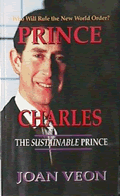Related
Articles:
Global Taxes Looming, Watch Your Wallet
Other
Veon
Articles:
US Leaders Highlight World Economic Forum Agenda
Global Taxation And Tax Harmonization
Does The
Global Economy Need a Global Currency?
WHAT ABOUT AFRICA?
By
Joan Veon
July 23, 2005
NewsWithViews.com
The focus for the last seven years, since the last G8 in England, has been aid for Africa. In 1998, the churches organized the Jubilee Debt Relief Campaign. The terminology used was to remind world leaders of the Biblical Year of Jubilee recorded in the Old Testament where the debts of debtors were forgiven. I remember going to a non-governmental organization-NGO workshop where I interviewed a key leader about global taxation. I asked him what they were going to do with the huge flows possible from the global tax. He told me that there would be enough for both Africa and the United Nations! Seven years later, both debt forgiveness and the concept of global taxation have come full circle. This is it. This is where the rubber meets the road.
Over the last ten years, the idea of global tax has gone through a number of revisions. Last year French President Jacques Chirac put the idea of global tax on the leader�s agenda and promised concrete recommendations. His proposed �International Solidarity Levy� would levy a tax on airline tickets. Countries in favor include Brazil, China, and Germany. Currently there are no international treaties that prohibit the creation of a flat tax on airline tickets since a number of airlines already have various types of taxes on airline tickets for airport renovation and the like. The rate would be personalized according to country acceptance. Revenues would be collected by the airlines and passed on to the respective country which would supplement their foreign aid funds.
Before the world commits to the French plan which has been laid on the table and is in the process of being proposed now to the leaders of the entire world at the September United Nations General Assembly, there are a number of questions that should be asked, �How come Africa had no problems while they were colonies of Britain?� and �Why has Africa been the focus of wars and revolutions since the time of de-colonization?� Complex questions have complex answers. For people seeking truth, we will take a look at the Commonwealth, World Bank loans, NSSM200, the conditions being put on Africa, and global taxation.
First, let us take a look at what the Commonwealth of Nations is all about. According to the Internet encyclopedia, Wikipedia.org, �The Commonwealth of nations is a voluntary association of independent sovereign states, mostly formed by the United Kingdom and its former colonies.� Today there are counties that acknowledge the British monarch as head of state and those that only recognize the queen as Head of the Commonwealth.
The old British Empire, we are told, was dismantled after World War II beginning with India. When de-colonized, many countries became republics. The London Declaration, which provided for members to accept the British monarch as Head of the Commonwealth regardless of their domestic constitutional arrangements, is now considered by many to be the start of the modern Commonwealth.
The population of the Commonwealth is about 1.8 billion people which comprise about 30% of the world�s population. India is the most populous member with a billion people while Pakistan, Bangladesh, and Nigeria have more than 100 million people. The land of Commonwealth nations equals about twenty-five percent of the world�s land area.
When the UN was formed in 1945, Canada, New Zealand, and the UK had three votes. As Britain de-colonized countries, they were made voting members of the United Nations. Between 1946-1989, a total of 42 countries were de-colonized, thus giving the Commonwealth the potential of 54 votes which includes those countries that were already independent.
Apart from the votes which the Commonwealth has at the United Nations and at other international organizations, it is important to understand that the war, genocide, and the problems of poverty did not exist in Africa before de-colonization. Interestingly enough, of the twenty countries de-colonized between 1960-1969, seven are today Highly Indebted Poor Countries. They include Ghana which is rich in gold, bauxite, manganese and diamonds; Guyana which is rich in bauxite, manganese, gold and diamonds; Uganda which is rich in copper and cobalt, Tanzania which is rich in gold, diamonds and coal and Zambia which is rich in copper.
So why are they having trouble in today�s globalized world? We can go back to World Bank loans during the 1970s which were forced on a number of African countries. Under World Bank President Robert McNamara, who served as president from 1969 to 1981, World Bank economists forced their way into countries in order to come up with a financial plan for their new development. Even the president of that country was not privy to what the plan said, but was under the gun of the World Bank to take loans to carry out these grandiose projects. The idea was that the income generated from the project would provide moneys to repay the loans. Unfortunately that did not happen. These are the Highly Indebted Poor Countries which you and I are being asked to bail out through increased foreign aid, debt forgiveness, and/or international taxation.
If this was not enough, there is more devastation that the African continent was subjected to. Interestingly enough, it occurred AFTER de-colonization. In 1974, President Richard Nixon was presented with a study by the National Security Council which is called, �NSSM 200 - Implications of Worldwide Population Growth for U.S. Security and Overseas Interests.� This 250 page report was a result of a four year study which he had requested on August 10, 1907 in National Security Decision Memorandum 76. This memorandum recommended that the U.S. propose a United Nations study of �world population problems and measures required to deal with them as a top priority in the Second Development Decade.� When the study was completed in May, 1974, it was sent to Nixon along with a memo by Dr. Henry Kissinger, then National Security Advisor, in which he recommended the need for the U.S. to provide leadership �in world population matters.�
NSSM200 suggested that the U.S. needed �access to minerals which are necessary for military and industrial uses and for which the U.S. must reply on imports. Where these �strategic and critical� materials are concerned, therefore, U.S. economic stakes in the developing world coincide with military considerations� (NSSM 200). Furthermore, it points out that if the resources found in a number of Lesser Developing Countries are important to the U.S. and if those countries develop with a normal increase in population, they will have a greater need for their resources, which means the U.S. will not have access to them. In other words, it was to the advantage of the U.S. to keep these countries from developing so the U.S. could have access to them.
The report identified using foreign aid funds as a way of �helping� the leaders of targeted countries to embrace population reduction. The report placed the agenda of population reduction on the shoulders of the United Nations, non-governmental organizations, and a number of UN agencies and commissions.
The United Nations did exactly what the U.S. government told them to do. They made population reduction a key focus of their agenda through Agenda 21 and sustainable development. At the UN Conference on Population and Development in 1994 in Cairo, African women asked representatives from Planned Parenthood International why they could only get condoms and not aspirins at their health clinics.
According to the British publication, Newstateman, more than $400B of overseas aid, channeled through African governments, the African people are on the whole poorer than they were 30 years ago.
So how much does Africa owe the World Bank and the International Monetary Fund? According to John Hilary from War on Want, about $532B is owed by the 60 highly indebted poor countries. Currently only 18 countries have qualified for debt forgiveness because they have met the conditions World Bank conditions. The amount of debt forgiveness is $40B but the debt servicing of the remaining $492B is $45B a year.
The World Bank�s program for Highly Indebted Poor Countries-HIPC is funded by pledges and paid-in contributions. Steps poor countries have to take to qualify for a reduction in debt include: changing their structure of government to be �more accountable�, make all financial figures public (transparency), privatize their energy sector, water, electricity, etc. and work through regional blocks with other cities and states (this is regional government which is appointed, not elected officials).
Today what you see is the plea for business to come in and partner with African governments. The Prince of Wales International Business Leaders Forum has called for �ten practical actions to support Africa�s development.� One of them is, �Work with other businesses in partnership with civil society organizations to support, social, health, human development and enterprise development.�
At every turn, it is public-private partnership, selling off government owned resources, or privatizing through partnering with business. This is seen in President Clinton�s New Partnership for African Development-NEPAD. President Bush has set up his own initiative, the Millennium Challenge Corporation-MCC, a U.S. government corporation, to administer funds. An informational brochure handed out described it as �an innovative new foreign assistance program designed to eliminate extreme poverty and promote sustainable economic growth.� The purpose is to set up public-private partnerships-PPP. PPP�s are business arrangements for governments to transfer state-owned assets to. Since it is a business arrangement, it is run by the corporate partner. As expected, there are steps that countries need to take in order to be eligible, just like the World Bank qualifications. For example, the MCC Board approved a Compact with Cape Verde for approximately $110M. The Compact will support their efforts in achieving its overall national development goal of transforming its economy from aid-dependence to sustainable, private-sector led growth.�
At the 2002 UN World Summit on Sustainable Development, an international public-private partnership, �The Congo Basin Forest Partnership,� was announced. It has eight African countries, six of the G8 countries, the American Forest and Paper Association, and four major environmental organizations including World Wildlife Federation as partners. Seventy-four million acres of land in Africa will be moved into this partnership! In an interview with a U.S. State Department official by colleague Joan Peros, he refused to comment on any debt-for-nature swaps!
The question that should be asked is �What will these countries have left once they privatize their state owned assets and change their form of government to meet a global structure of government?
In an interview with an African official from an African consumers group, he voiced the same concerns. They have made it very clear to G8 leaders that they do not want any more aid with strings and privations.
On the other hand, as reported by the British magazine, Newstatesman, many African countries are turning to China for help. Nearly 700 Chinese companies operate in 49 African countries. Chinese trade with Africa will reach $30B next year�triple the level five years ago. By the end of 2005, according to the French paper, LeMonde, China will overtake Britain as Africa�s third-largest trading partner and it is increasingly turning to Africa as a source for oil, timber, and minerals for support its phenomenal growth.
The Sierra Leone tourism board and the Chinese construction company Henan Gouji recently signed a $220M agreement for a luxury golf course and five star hotel. Their tourism minister said, �Why should we wait for Britain or anyone else to get here? The Chinese are the ones coming to invest now.�
Last year, China�s export bank extended a $2B line of credit to the Angolan government for infrastructure projects. In return for low interest rates and a long repayment schedule, Angola will provide China with 10,000 barrels of oil a day and award China with large construction contracts. In Sudan where the U.S. maintains partial oil sanctions, China has become that country�s largest trading partner. The list goes on.
Is this a case of creating a major continental-wide problem and then solving it to get the intended result which is a grand transfer of wealth?
|
Subscribe to the NewsWithViews Daily News Alerts! |
In
conclusion, it is not only the assets of Africa which are at stake,
but the whole transfer of wealth through our tax-dollars to support
the �war on poverty.� In an interview with French President Jacques
Chirac, I asked if the proposed �International Solidarity Levy� is
going to be duplicated once it is in place. He told me there are many
different proposals for global tax. I would assume that if the airline
tax is passed without great opposition, that it will open �Pandora�s
Box� to a countless number of other international taxes. Without Africa,
global taxation would not be possible. So, what about Africa?
� 2005 Joan Veon - All Rights Reserved
Sign Up For Free E-Mail Alerts
E-Mails
are used strictly for NWVs alerts, not for sale
 Order
Joan Veon's book;
Order
Joan Veon's book;
"The
United Nations'
Global Straitjacket"
Joan Veon is a businesswoman and international reporter, having covered 64 Global meetings around the world in the last ten years. Please visit her website: www.womensgroup.org. To get a copy of her WTO report, send $10.00 to The Women's International Media Group, Inc. P. O. Box 77, Middletown, MD 21769. For an information packet, please call 301-371-0541
E-Mail: jveon@adelphia.net
So why are they having trouble in today�s globalized world? We can go back to World Bank loans during the 1970s which were forced on a number of African countries. Under World Bank President Robert McNamara, who served as president from 1969 to 1981











